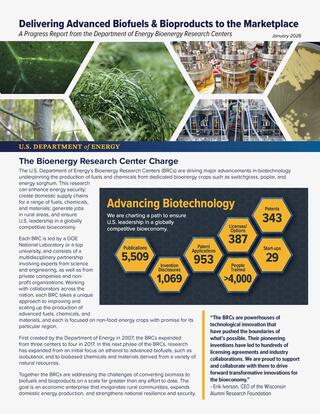BRC Program Overview
The U.S. Department of Energy-funded Bioenergy Research Centers (BRCs) are conducting research to develop a viable and sustainable domestic biofuel and bioproducts industry from dedicated bioenergy crops such as switchgrass, poplar, and energy sorghum. This research has the potential to boost future energy security, lower greenhouse gas emissions, diversify the range of available bio-based products, and create jobs in rural areas.
Each BRC is led by a DOE National Laboratory or a top university, and consists of a multidisciplinary partnership involving experts from science and engineering, as well as from private companies and non-profit organizations. Geographically diverse, each BRC takes a unique approach to improving and scaling up the production of advanced biofuels and bioproducts, and each is focused on biomass energy crops with promise for its particular region.
First created by the Department of Energy in 2007, the BRCs expanded from three centers to four in 2017. In this next phase of the BRCs, research has expanded from an initial focus on ethanol to advanced biofuels such as isobutanol, and to bioproducts that can replace chemicals currently derived from petroleum or natural gas.
Together the BRCs are addressing the challenges of converting biomass to biofuels and bioproducts on a scale far greater than any effort to date.
| Attachment | Size |
|---|---|
| BRC-Overview_20260127.pdf | 1.48 MB |
